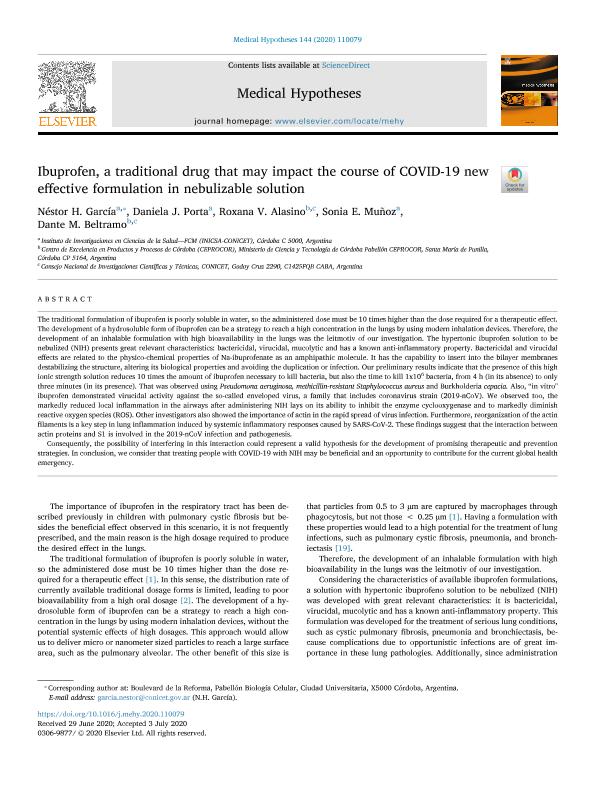Artículo
Ibuprofen, a traditional drug that may impact the course of COVID-19 new effective formulation in nebulizable solution
García Canclini, Néstor; Porta, Daniela Josefina ; Alasino, Roxana Valeria
; Alasino, Roxana Valeria ; Muñoz, Sonia Edith
; Muñoz, Sonia Edith ; Beltramo, Dante Miguel
; Beltramo, Dante Miguel
 ; Alasino, Roxana Valeria
; Alasino, Roxana Valeria ; Muñoz, Sonia Edith
; Muñoz, Sonia Edith ; Beltramo, Dante Miguel
; Beltramo, Dante Miguel
Fecha de publicación:
11/2020
Editorial:
Elsevier
Revista:
Medical Hypotheses
ISSN:
0306-9877
Idioma:
Inglés
Tipo de recurso:
Artículo publicado
Clasificación temática:
Resumen
The traditional formulation of ibuprofen is poorly soluble in water, so the administered dose must be 10 times higher than the dose required for a therapeutic effect. The development of a hydrosoluble form of ibuprofen can be a strategy to reach a high concentration in the lungs by using modern inhalation devices. Therefore, the development of an inhalable formulation with high bioavailability in the lungs was the leitmotiv of our investigation. The hypertonic ibuprofen solution to be nebulized (NIH) presents great relevant characteristics: bactericidal, virucidal, mucolytic and has a known anti-inflammatory property. Bactericidal and virucidal effects are related to the physico-chemical properties of Na-ibuprofenate as an amphipathic molecule. It has the capability to insert into the bilayer membranes destabilizing the structure, altering its biological properties and avoiding the duplication or infection. Our preliminary results indicate that the presence of this high ionic strength solution reduces 10 times the amount of ibuprofen necessary to kill bacteria, but also the time to kill 1x106 bacteria, from 4 h (in its absence) to only three minutes (in its presence). That was observed using Pseudomona aeruginosa, methicillin-resistant Staphylococcus aureus and Burkholderia cepacia. Also, ?in vitro´´ ibuprofen demonstrated virucidal activity against the so-called enveloped virus, a family that includes coronavirus strain (2019-nCoV). We observed too, the markedly reduced local inflammation in the airways after administering NIH lays on its ability to inhibit the enzyme cyclooxygenase and to markedly diminish reactive oxygen species (ROS). Other investigators also showed the importance of actin in the rapid spread of virus infection. Furthermore, reorganization of the actin filaments is a key step in lung inflammation induced by systemic inflammatory responses caused by SARS-CoV-2. These findings suggest that the interaction between actin proteins and S1 is involved in the 2019-nCoV infection and pathogenesis.Consequently, the possibility of interfering in this interaction could represent a valid hypothesis for the development of promising therapeutic and prevention strategies. In conclusion, we consider that treating people with COVID-19 with NIH may be beneficial and an opportunity to contribute for the current global health emergency.
Palabras clave:
COVID-19
,
IBUPROFEN
,
PNEUMONIA
,
SARS-CoV-2
,
ANTIVIRAL
,
ANTIINFLAMATORY
Archivos asociados
Licencia
Identificadores
Colecciones
Articulos(CCT - CORDOBA)
Articulos de CTRO.CIENTIFICO TECNOL.CONICET - CORDOBA
Articulos de CTRO.CIENTIFICO TECNOL.CONICET - CORDOBA
Articulos(INICSA)
Articulos de INSTITUTO DE INVESTIGACIONES EN CIENCIAS DE LA SALUD
Articulos de INSTITUTO DE INVESTIGACIONES EN CIENCIAS DE LA SALUD
Citación
García Canclini, Néstor; Porta, Daniela Josefina; Alasino, Roxana Valeria; Muñoz, Sonia Edith; Beltramo, Dante Miguel; Ibuprofen, a traditional drug that may impact the course of COVID-19 new effective formulation in nebulizable solution; Elsevier; Medical Hypotheses; 144; 11-2020; 1-3; 110079
Compartir
Altmétricas



